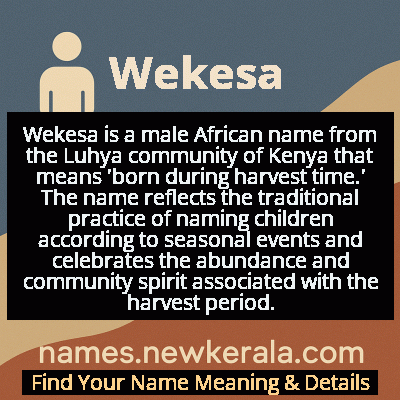Wekesa Name Meaning & Details
Origin, Popularity, Numerology Analysis & Name Meaning of Wekesa
Discover the origin, meaning, and cultural significance of the name WEKESA. Delve into its historical roots and explore the lasting impact it has had on communities and traditions.
Name
Wekesa
Gender
Male
Origin
African
Lucky Number
1
Meaning of the Name - Wekesa
Wekesa is a male African name from the Luhya community of Kenya that means 'born during harvest time.' The name reflects the traditional practice of naming children according to seasonal events and celebrates the abundance and community spirit associated with the harvest period.
Wekesa - Complete Numerology Analysis
Your Numerology Number
Based on Pythagorean Numerology System
Ruling Planet
Sun
Positive Nature
Leaders, ambitious, highly driven, self-reliant, innovative.
Negative Traits
Overly aggressive, domineering, impatient, selfish.
Lucky Colours
Red, orange, gold.
Lucky Days
Sunday.
Lucky Stones
Ruby, garnet.
Harmony Numbers
2, 3, 9.
Best Suited Professions
Entrepreneurs, managers, engineers.
What People Like About You
Courage, determination, leadership.
Famous People Named Wekesa
Wekesa Wamalwa
Politician
Former Kenyan Minister and Member of Parliament
Wekesa Khisa
Academic
Renowned scholar in African studies and cultural preservation
Wekesa Simiyu
Athlete
Professional footballer who played for Kenyan Premier League teams
Wekesa Mukhwana
Community Leader
Prominent elder and cultural preservationist among the Luhya community
Name Variations & International Equivalents
Click on blue names to explore their detailed meanings. Gray names with will be available soon.
Cultural & Historical Significance
The name Wekesa embodies the Luhya people's deep connection to the land, their agricultural heritage, and the communal values that have sustained their society for generations. It represents not just an individual's birth timing but also the collective success and prosperity of the entire community during that period. In traditional Luhya society, harvest time was a period of celebration, gratitude, and redistribution of resources, making children born during this season symbolic of community blessings and future security. The preservation of such names in modern times reflects ongoing cultural resilience and the importance of maintaining indigenous knowledge systems.
Extended Personality Analysis
Individuals named Wekesa are often perceived as hardworking, reliable, and community-oriented, reflecting their harvest-time origins. They tend to exhibit patience and perseverance, understanding that meaningful achievements require sustained effort over time, much like the agricultural cycles that inspired their name. These individuals typically demonstrate strong practical skills and a grounded approach to life's challenges. Their personality often includes natural leadership qualities, particularly in organizing and motivating groups toward common goals.
Wekesas are generally seen as providers and stabilizers within their families and communities, embodying the abundance and security associated with harvest time. They tend to be methodical in their approach to problems and show remarkable resilience during difficult periods, drawing strength from their cultural heritage of agricultural persistence and seasonal renewal. While they may appear reserved initially, they often reveal deep emotional intelligence and strong family values upon closer acquaintance. The name's agricultural roots also suggest individuals who understand natural cycles and timing, often displaying wisdom in knowing when to act and when to wait for more favorable conditions.
Modern Usage & Popularity
In contemporary times, Wekesa remains a popular name among the Luhya community and has gained recognition across Kenya as a distinctive African name. While maintaining its traditional significance, the name has adapted to modern urban settings where agricultural connections may be less direct. Many educated, urban-dwelling Luhya families continue to choose Wekesa to preserve cultural identity and honor ancestral traditions. The name appears in professional contexts, academic circles, and public life, demonstrating its enduring relevance. Recent trends show increased pride in indigenous names, leading to renewed interest in names like Wekesa among younger generations seeking to reconnect with their cultural roots while navigating modern Kenyan society. The name's usage has also spread beyond Kenya's borders through diaspora communities, serving as a cultural marker and connection to Luhya heritage worldwide.
Symbolic & Spiritual Meanings
Symbolically, Wekesa represents abundance, fulfillment, and the rewards of patient labor. The name carries metaphorical meanings of prosperity, completion of cycles, and the joy that comes after sustained effort. It symbolizes the connection between human endeavor and natural rhythms, reminding bearers that timing and preparation are essential for success. Like the harvest that follows months of cultivation, Wekesa embodies the principle that meaningful achievements require both planning and patience. The name also symbolizes community interdependence, as traditional harvests were collective endeavors that strengthened social bonds and ensured communal survival. These symbolic associations make Wekesa a name that carries deep philosophical undertones about life's cyclical nature and the relationship between effort and reward, serving as a constant reminder that periods of scarcity are often followed by abundance when approached with diligence and hope.

